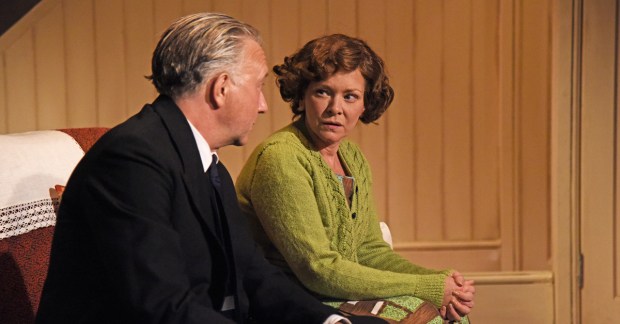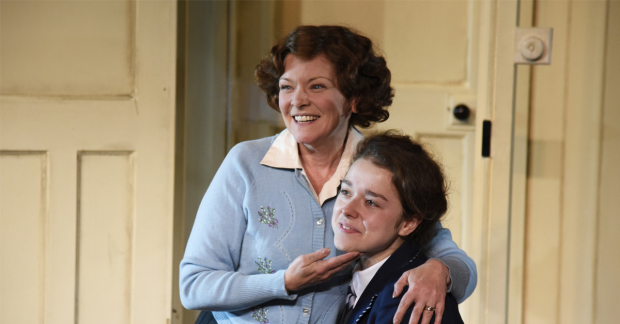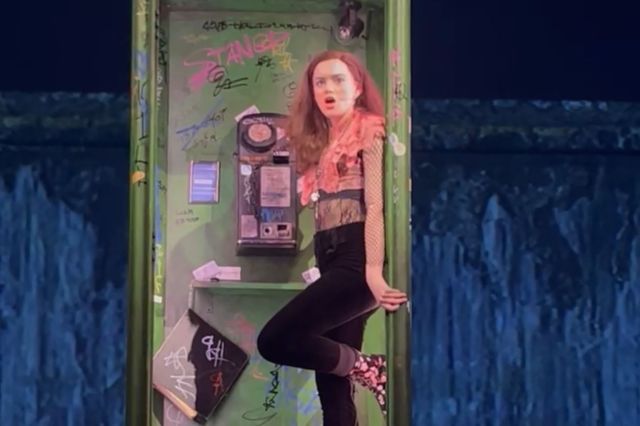Review: Pack of Lies (Menier Chocolate Factory)
Hugh Whitemore’s classic suburban thriller is revived at the Menier

© Nobby Clark
How would you feel if you discovered that your best friends, the people who lived next door on your suburban street, turned out to be spies? What strains would be placed on you, on your faith in human nature, on your view of the entire world if you were told that people you trusted and loved were in fact living a lie?
Those are the essential questions that underly Hugh Whitemore's skilful, absorbing play, based on the true story of Helen and Peter Kroger who moved into Cranley Drive, Ruislip, pretending to be Canadians, a bookseller and his loud-mouth wife, and who were exposed as double agents, selling secrets to the Russians.
That they were captured was thanks to their neighbours Bob and Barbara Jackson, who let MI5 officers watch their movements from the bedroom of their daughter Julie (bright Macy Nyman), creating their own web of lies that undermine the integrity and honesty of their family. "You've made us lie," Barbara (Finty Williams) accuses the smooth security officer Stewart (Jasper Britton) in the play's final confrontation. "I trusted Helen. I loved her."
The universality of that emotion, of the way that the canker of distrust can eat away at friendship and love is what makes Whitemore's play, written in 1983 (adapted from his own TV play, screened in 1971) and set in 1960 escape the bonds of the Cold War that could tether it too tightly to its period.
The cleverness of Hannah Chissick's production is that she roots it very strongly in its exact time and place but lets the humanity of its theme fly. Paul Farnsworth's set is a miraculous recreation of a suburban house, with antimacassars on the velour sofa, a three-bar electric fire for heating and the only phone firmly in the hall. It stretches the width of the Menier, the space carefully delineated with doors and windows, and a huge black Ford parked outside.
The detail extends beyond the set. Bob (Chris Larkin) pulls on a comfy cardigan when he comes in from work; Barbara tugs at the cuffs of her own tightly buttoned knitwear as anxiety begins to eat at her soul; the exotic wonder of Helen (Tracy-Ann Oberman) all large gestures and extravagant gifts is partly explained by her ritzy trousers and big coats.

© Nobby Clark
But this social realism is combined with a more abstract sense of emotional reality. Most of the characters have a moment in the spotlight, to explain their story; all find truth in the playing of people held in the past, but still recognisable. Larkin in particular catches exactly that buttoned-up decency, that nervous respect for authority, that was characteristic of men of his time, but he also touches the heart very directly as he reveals just how his happiness has vanished.
As Stewart, Britton shows the steel and the class privilege beneath his smooth exterior. And Oberman is devastatingly good as Helen, catching her blousy warmth and yet also her profound wariness; whenever she thinks no one is watching her eyes scan the room, seeking information. She perfectly encapsulates the dilemma of the play: can feeling be real when it is based on an untruth? "People don't stop being people just because they have done wrong," as Barbara tentatively puts it.
Williams has made a brave move in taking on the role of Barbara, directly stepping into the award-winning footsteps of her mother Judi Dench, who played the part in its original West End run (opposite her husband Michael Williams as Bob.) It was the first time I saw her on stage, and I remember her subtle take with profound pleasure.
But Williams is grand too, mining Barbara's self-awareness, her shrewd understanding of class and deference, her knowledge that if she were braver she would act differently. When the strain on her begins to tell, she finds huge reserves of sadness and courage. The quiet scene between her and Natalie Walter's still, sympathetic Thelma, is transfixing in its emotional punch.
Whitemore died in July, knowing this revival was underway. He would have loved it.



















